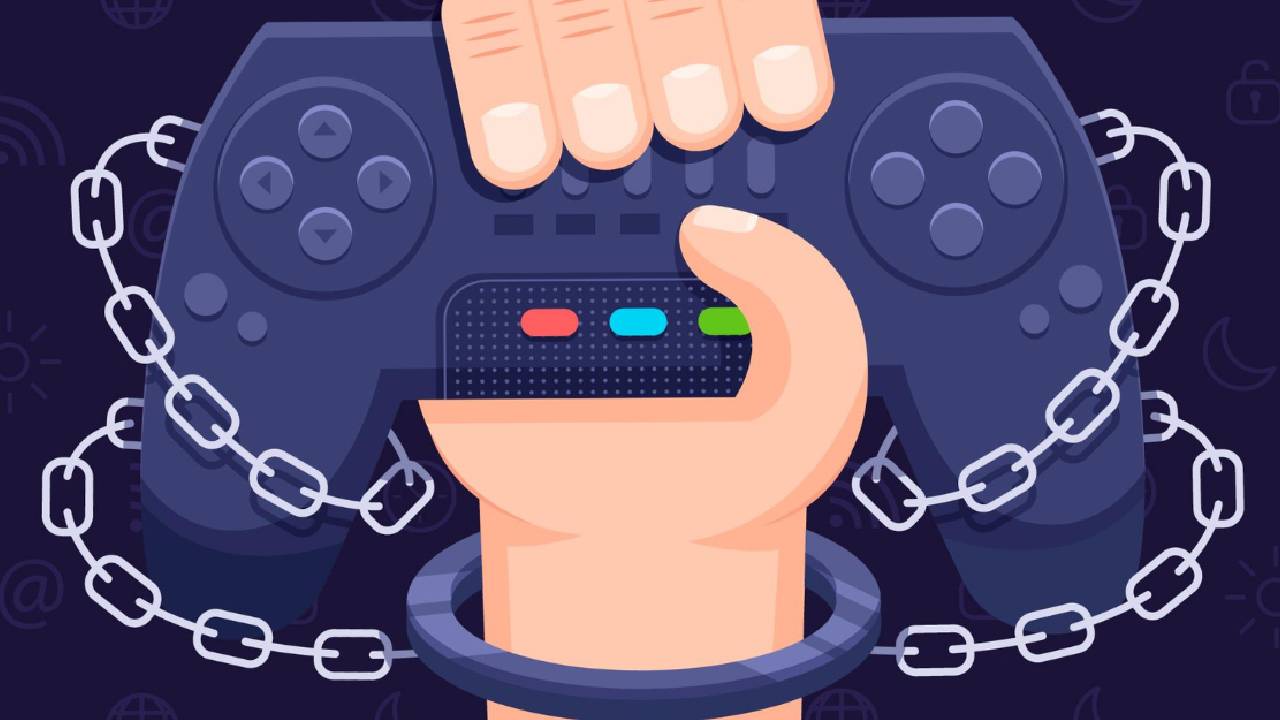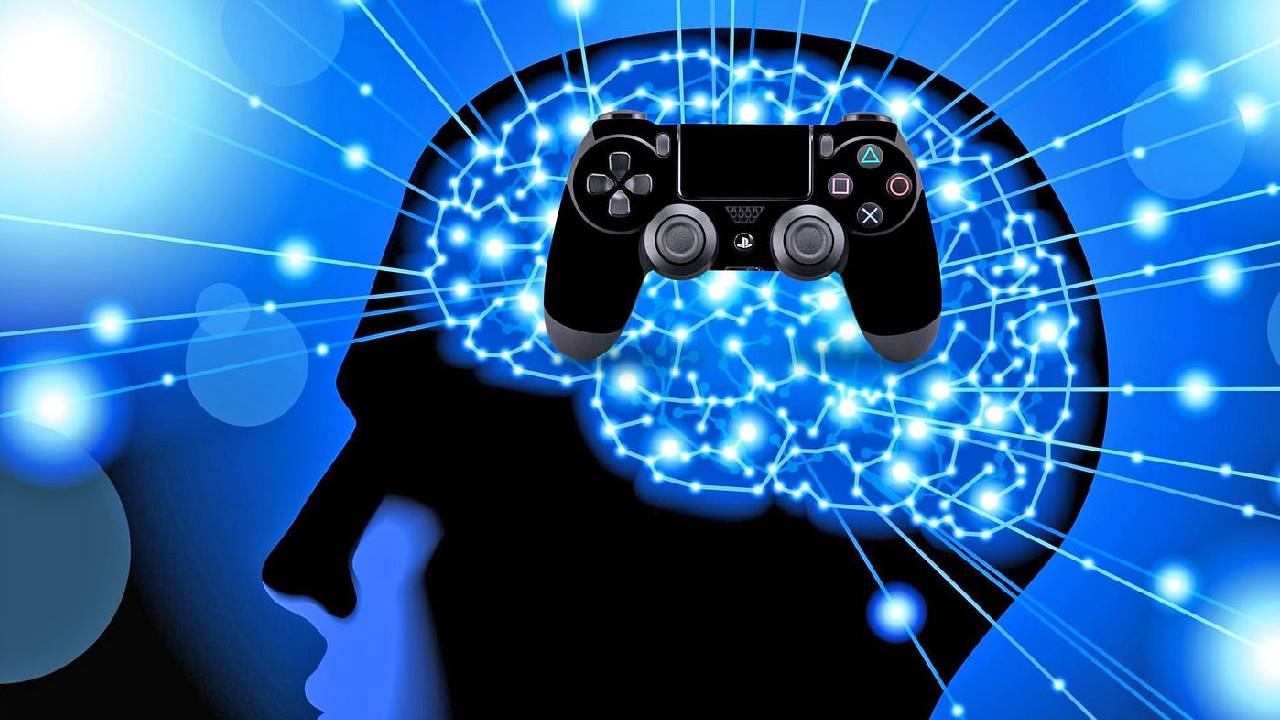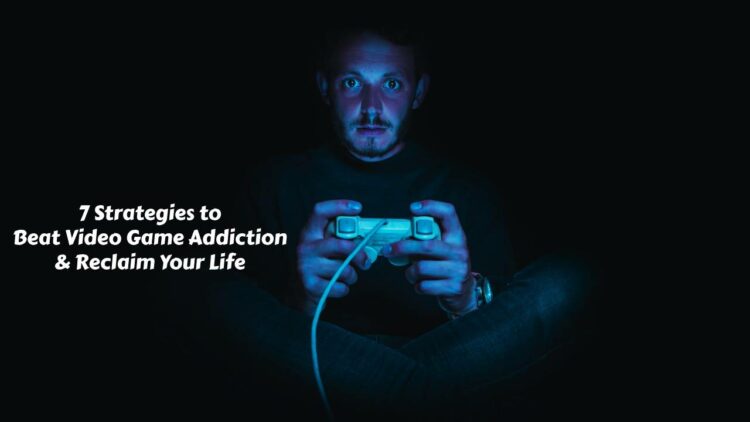Video Game Addiction – a term that has been making headlines and raising concerns in recent years. More and more people, young and old alike, are finding themselves caught in the grips of this digital vice.
It’s a concern that transcends generations, with parents and children alike facing the challenge of balancing screen time and real-life experiences.
In this blog post, we’ll delve into the rising concern of Video Game Addiction, shedding light on its impact and prevalence. But fear not, for we won’t leave you hanging.
We’re about to unveil seven powerful strategies that can help you, or someone you know, break free from the clutches of Video Game Addiction and reclaim a life filled with balance and fulfillment. So, let’s dive in and discover the path to recovery.
Understanding Video Game Addiction

Video Game Addiction is a real concern that affects many people, and it’s crucial to comprehend what it is and how to recognize it. In this section, we will break down the concept of video game addiction into two key aspects:
What Is Video Game Addiction?
Video game addiction, often referred to as gaming disorder, is when a person becomes excessively and compulsively engaged in playing video games to the point where it starts to harm their daily life.
It’s like when you really, really like playing a game, but you just can’t stop, even when it’s time to do other important things like homework or spend time with friends and family.
Signs and Symptoms of Video Game Addiction
To understand if someone might be struggling with video game addiction, it’s essential to look for signs and symptoms. These are like clues that can help us figure out if there’s a problem.
Signs include things like spending too much time playing games, neglecting schoolwork or chores, and feeling upset or irritated when not playing. If you or someone you know shows these signs, it’s important to pay attention and seek help when needed.
The Impact of Video Game Addiction
Video game addiction can significantly influence the lives of young gamers when considering the advantages and disadvantages of virtual reality. While it provides immersive and educational opportunities, overuse can result in addiction, impacting mental and physical well-being, social interactions, and academic performance. Achieving a balanced approach is essential for a healthier gaming experience.

Video Game Addiction isn’t just a regular problem; it can have some pretty big effects on a person’s life. Let’s take a closer look at how this addiction can change things, with a focus on two important aspects:
How Video Game Addiction Affects Your Life
When someone becomes addicted to video games, it can start to take over their life. It’s like when a game becomes the boss, and everything else, like school, friends, and family, takes a back seat. This can lead to trouble in school, arguments at home, and even losing touch with friends.
The Psychological and Physical Toll
Playing games for hours on end can also mess with a person’s mind and body. It can make them feel really stressed, anxious, or even sad.
Plus, sitting in one place for too long isn’t good for our bodies either; it can make us feel tired and sluggish. Understanding these impacts is the first step in helping someone who might be dealing with video game addiction.
Strategy 1: Self-Awareness
When it comes to dealing with video game addiction, the first strategy is a bit like having a superpower: Self-Awareness. This power helps you understand what’s happening and decide if you need to make changes. In this section, we’ll explore two important steps in becoming self-aware about video game addiction:
Recognizing Your Addiction
The very first thing to do is to recognize if you or someone you know might be addicted to video games. It’s kind of like noticing when you’re eating too many cookies – you realize that you just can’t stop.
In the case of video game addiction, it’s when playing games takes up most of your time, and you find it tough to do other things you used to enjoy, like going outside or spending time with friends.
Assessing the Severity
Once you’ve spotted the signs of video game addiction, it’s important to figure out how big of a problem it is. Is it a little problem, like eating one cookie too many, or a big problem, like eating a whole jar of cookies? Assessing the severity helps you understand how much help and support you might need to overcome it.
Remember, it’s okay to ask for help from parents, friends, or professionals when things feel tough. Being self-aware is like being your own superhero, ready to take on the challenges of video game addiction.
Strategy 2: Setting Clear Goals
Now that we’ve talked about being aware of video game addiction, let’s jump into the next superpower: Setting Clear Goals. Imagine you’re playing a game, and you know exactly what you need to do to win – that’s what setting clear goals is all about. In this section, we’ll break it down into two parts:
Defining Your Path to Recovery
Just like in a game where you have a map to follow, you’ll need a plan to beat video game addiction. That plan starts with setting clear goals. It’s like saying, “I want to get better, and here’s how I’m going to do it.” These goals can be like stepping stones on the path to recovery, showing you the way forward.
Short-Term vs. Long-Term Goals
Goals come in different shapes and sizes. Some are like little goals you can achieve quickly, while others are like big, long-term goals that take time and effort.
Setting both short-term and long-term goals helps you stay focused and motivated. It’s like playing a game where you complete small tasks to reach the big prize at the end. So, let’s start setting those goals and get ready to win the game against video game addiction!
Strategy 3: Creating a Support System
Imagine you’re on a big, exciting adventure with lots of challenges. What makes it easier and more fun? Having friends and allies by your side! That’s what Strategy 3, Creating a Support System, is all about when it comes to video game addiction. We’ll explore two important parts of this strategy:
The Importance of Seeking Help
Sometimes, when we’re facing a tough challenge, like video game addiction, it’s essential to ask for help. It’s like telling a trusted friend or an adult about a tricky level in a game – they can offer advice or even play alongside you. Seeking help is a brave and smart move, and it can make the journey to overcoming video game addiction much smoother.
Building a Supportive Network
Building a Supportive Network means having people who understand and care about your recovery. It’s like forming a team in a game; each member has a unique role to play. Your team could include family members, friends, teachers, or counselors – people who want to see you succeed and are ready to support you.
Together, you’ll be better equipped to conquer the challenges of video game addiction. So, let’s start building that team and embark on this important adventure!
Strategy 4: Establishing Boundaries
Imagine you’re playing your favorite game, and there’s a rulebook to follow. That rulebook helps everyone have a fair and fun time. Well, in real life, we need some rules too, especially when it comes to video game addiction. Strategy 4 is all about Establishing Boundaries, and we’ll explore two important rules:
Setting Healthy Gaming Limits
Just like playing a game for too long can make you tired, spending too much time on video games can have a similar effect. Setting Healthy Gaming Limits means deciding how much time is okay to play each day.
It’s like saying, “I’ll play for one hour today, and that’s it.” These limits help keep your gaming in check and make sure there’s time for other important things in your life.
Balancing Screen Time
Balancing and managing the impact of Screen Time is all about making sure you don’t spend all your time in front of a screen, whether it’s a computer, tablet, or phone. It’s like having a balanced diet – you need a bit of everything to stay healthy.
So, while gaming can be loads of fun, it’s important to balance it with other activities like outdoor play, reading, or spending time with friends and family. By establishing these boundaries, you can enjoy games responsibly and keep video game addiction at bay.
Strategy 5: Finding Healthy Alternatives
Just like having a variety of snacks to choose from makes snack time more exciting, life can be more fun when we explore different activities besides video games. Strategy 5 is all about Finding Healthy Alternatives, and we have two exciting paths to explore:
Discovering New Hobbies and Interests
Imagine there’s a treasure chest of hobbies waiting for you to open. Exploring new hobbies and interests is like unlocking those treasures.
It’s a chance to try things you’ve never done before – like painting, playing a musical instrument, or learning a new sport. By discovering new hobbies, you can find exciting adventures outside of the gaming world.
Rediscovering Old Passions
Sometimes, we might have forgotten about things we used to love because video games took up a lot of our time. Rediscovering Old Passions is like finding a hidden gem in your own backyard. It could be a hobby or activity you used to enjoy, like reading, biking, or drawing.
Bringing these old passions back to life can add more colors to your world and help you overcome video game addiction. So, let’s embark on this journey of discovery and find the healthy alternatives that make life even more exciting!
Strategy 6: Professional Help
Sometimes, even the bravest adventurers need a wise guide or mentor to help them on their journey. Strategy 6 is all about seeking Professional Help when it comes to video game addiction. We’ll explore two important aspects:
When to Seek Professional Guidance
Imagine you’re playing a game, and you’re stuck on a really tough level that you just can’t beat on your own. That’s when you might ask for help from a more experienced player. In life, when video game addiction feels like a challenge you can’t conquer alone, it’s important to know When to Seek Professional Guidance.
This could be when gaming addiction is causing big problems in school, at home, or with your health. Professionals like therapists or counselors can be like experienced players who have valuable tips and strategies to share.
Types of Therapy and Counseling
Just like in different games, there are various characters with unique abilities, therapy and counseling come in different forms too. We’ll explore the Types of Therapy and Counseling available for those dealing with video game addiction.
Some might involve talking with a counselor, while others could include group therapy where you meet other people facing similar challenges. These professionals are like the wizards and warriors of the real world, ready to help you defeat the gaming addiction dragon. So, when you need it, don’t hesitate to seek their support on your quest to overcome video game addiction!
Strategy 7: Staying Accountable
In every grand adventure, there comes a time when heroes need to stay focused and true to their mission. Strategy 7, Staying Accountable, is all about keeping your eyes on the prize when it comes to conquering video game addiction. This strategy has two key parts:
Tracking Progress and Celebrating Milestones
Imagine you’re climbing a big mountain, and you want to know how far you’ve come. Tracking Progress and Celebrating Milestones is like putting flags along the way to mark your journey. It’s important to keep track of how you’re doing – how much time you’re spending on games and how well you’re sticking to your goals.
And when you reach important milestones, like reducing your gaming time or achieving other goals, it’s time for a celebration! These celebrations are like rewards that make your journey more enjoyable and show you how much you’ve achieved.
Overcoming Relapses
Even the best adventurers sometimes face setbacks, like when they take a wrong turn in a maze. Similarly, when dealing with video game addiction, it’s possible to have moments when you slip and play more than you planned.
Overcoming Relapses is all about getting back on your feet and continuing the journey. It’s okay to make mistakes; what matters is that you keep trying. We’ll explore strategies for bouncing back from relapses and staying strong on the path to recovery.
So, let’s embark on this final part of our adventure, staying accountable, and reaching the ultimate goal of overcoming video game addiction!
Conclusion
Now that we’ve uncovered these seven powerful strategies to overcome video game addiction, it’s time for you to take the first step toward recovery. Remember, you’re not alone on this journey. Seeking help, setting clear goals, and creating a supportive network are essential in this quest.
As you implement these strategies, always track your progress and celebrate your achievements. And don’t be discouraged if you face setbacks; overcoming relapses is a part of the process.
By following these strategies, you can reclaim your life from the clutches of video game addiction and unlock a world filled with balance and happiness.
We’d love to hear your thoughts and experiences. Feel free to share your feedback in the comments below and pass along this valuable information to your friends who might need it. Together, we can help more adventurers on their quest to conquer video game addiction and lead happier, healthier lives.

























